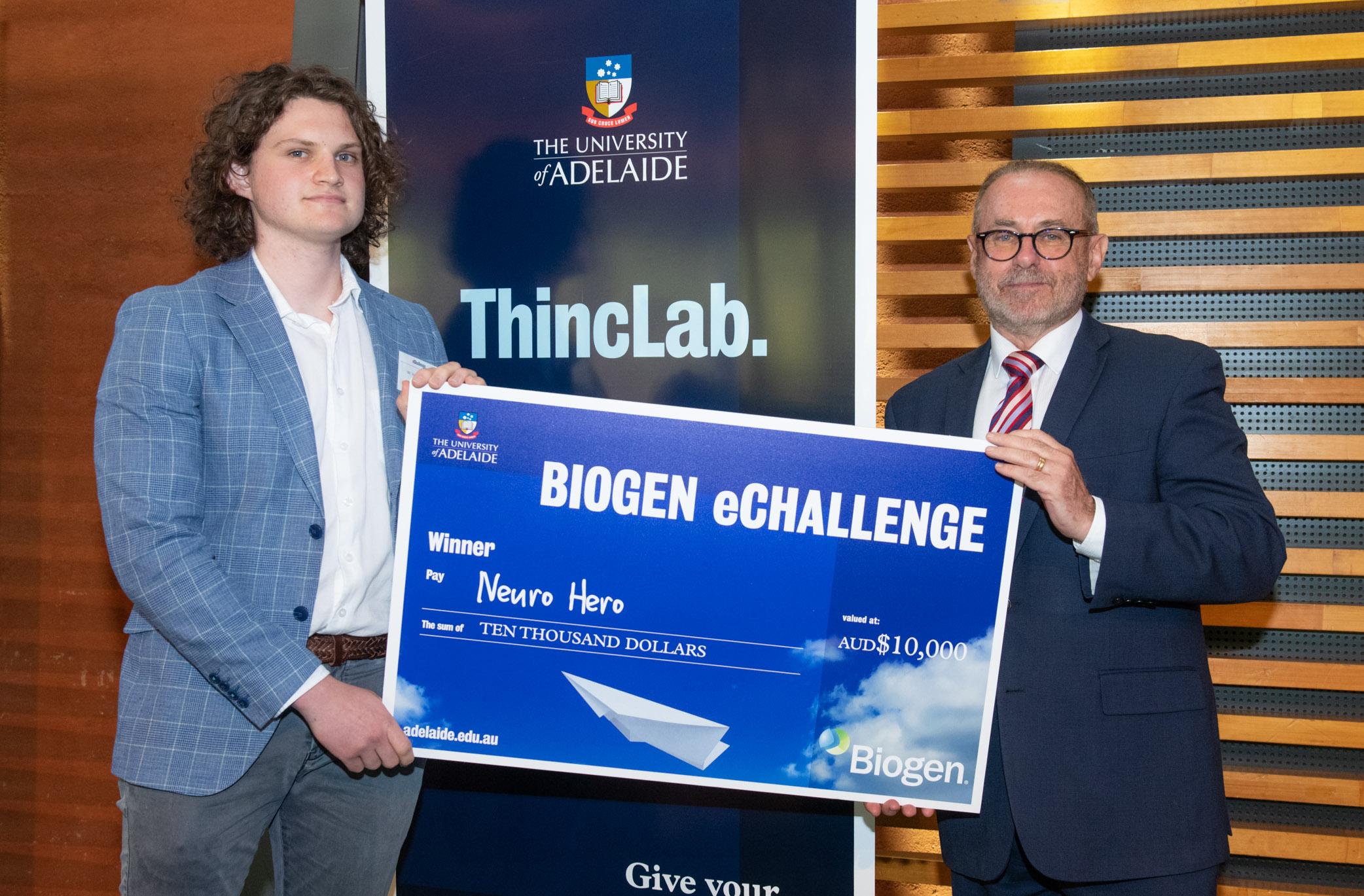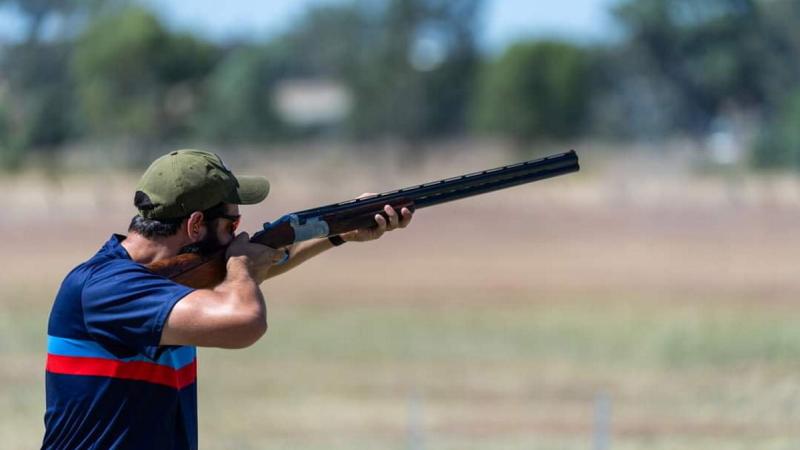
Harry Spurrier with Professor Noel Lindsay
Neuro Hero, a team that is developing solutions to tackle neurodegenerative disorders using virtual reality technology, has taken top spot in this year’s Australian eChallenge.
Social enterprise Neuro Hero is run by 19-year-old Harry Spurrier who is in the second year of studying for a Bachelor of Psychology at the University of Adelaide. His goal is to improve the lives of teenagers with debilitating neurodegenerative disorders such as motor neuron disease and muscular dystrophy.
“Thousands of teenagers and young adults in Australia are suffering from these diseases, creating a set of unique and difficult challenges that limit their ability to complete the most basic of tasks,” said Harry.
“It is difficult to navigate through adolescence for a healthy teen, and with a neurodegenerative disorder, an already confusing period becomes even more complicated, leading to a lack of drive, enthusiasm and ambition.”
Neuro Hero aims to incorporate proven therapeutic aspects of virtual reality, video games and at-home sustainable agriculture in order to give purpose to those suffering from these conditions.
“A virtual garden would act as a hub inside a virtual reality game in which participants can play minigames that will, in turn, correlate to growing produce in the hub,” said Harry.
“The produce from the virtual garden will then correlate to the real world where the people can opt into growing produce in their own homes and gardens based on the work done in the virtual garden, which can then be sold.
“Through this, the teenagers and young adults suffering these debilitating conditions have the opportunity to have real impact on their community and bringing a sense of purpose and belonging to their early adulthood.”
Harry’s concepts, which were presented to the eChallenge judges during the competition, have won him the Biogen overall prize of $10,000.
“The Australian eChallenge introduces young innovative entrepreneurs to the vibrant entrepreneurial community in South Australia.”Professor Noel Lindsay
The Australian eChallenge is an annual competition-based learning experience that develops strategic business thinking for early-stage entrepreneurial ventures. Run since 2001 by the University of Adelaide’s Adelaide Business School, the pre-accelerator program is a proving ground for future entrepreneurs. It is Australia’s longest running program of its kind.
Professor Noel Lindsay is Pro-Vice Chancellor – Entrepreneurship, and Dean of Business – Adelaide Business School at the University of Adelaide.
“The Australian eChallenge introduces young innovative entrepreneurs to the vibrant entrepreneurial community in South Australia,” said Professor Lindsay.
“The business leaders of the future use this unique and intensive innovation program as a springboard for their innovative ideas which could potentially impact lives worldwide.
“They are supported and guided by experienced business people during the eChallenge which stretches them to find solutions for society’s challenges.”
Teams pitch business proposals for their new, previously unfunded business concepts, to potential investors from the local business community. They compete for cash prizes – this year a total prize pool of more than $81,000 – and the prestige of being awarded the most outstanding Australian eChallenge entrepreneurial venture of the year.
Another of the competition’s top spots was taken by Adrian Johnston and Tanya Jayne of team HoneySense. Their concept uses artificial intelligence and biology to accelerate the time consuming process of pollen counting and classification, for application in authentication and traceability within the Australian honey industry.
“Our goal, through enabling apiarists and packers to authenticate their honey, is to improve the value of the Australian honey export market, by validating the uniqueness and purity of Australian honey,” said Adrian.
“Counting and classifying pollen grains can be used to identify the floral source of honey, tracing it back to its geographical and botanical origins but this is expensive and time consuming.”
Quality Assurance in food industries is more important than ever, with around 20 per cent of Australian honey found to be adulterated in 2018.
“HoneySense applies state-of-the-art computer vision techniques to detect pollen grains and measure their quantities, allowing for efficient authentication of floral sources,” said Adrian.
Tanya has a PhD in genetics from the University of Adelaide, where she researched the causes of Alzheimer’s disease. Adrian completed a PhD in artificial intelligence at the University of Adelaide’s Australian Institute for Machine Learning. Tanya and Adrian won the eChallenge 1st Prize of $10,000 and $2000 worth of consultancy from Madderns Patent & Trade Mark Attorneys.
Forty-nine teams, consisting of 180 participants, took part in this year’s competition. Competition streams include the general category and Biogen eChallenge.
Winners were announced on Tuesday 1 December at the National Wine Centre and the awards ceremony was streamed live.
Complete list of the Australian eChallenge winners:
Biogen overall winner: Neuro Hero. Harry Spurrier. $10,000
eChallenge 1st Prize: HoneySense. Tanya Jayne and Adrian Johnston. $10,000 cash, $5,000 worth of space and incubation at ThincLab and $2000 worth of consultancy from Madderns Patent & Trade Mark Attorneys.
eChallenge 2nd Prize: EcoSystem Farms. Amanda (Mandy) Mercorella and Brendan Dobson. $5000 cash, $5,000 worth of space and incubation at ThincLab and $1000 consultancy from Madderns Patent & Trade Mark Attorneys. EcoSystem Farms is a prototype aquaponics farm which grows better than organic, spray free produce and high quality, healthy trout.
eChallenge 3rd Prize: Pest Defender. Tylah Kendall and Artem Ambrose. $2000 cash, $5,000 worth of space and incubation at ThincLab and $500 consultancy from Madderns Patent & Trade Mark Attorneys. Pest Defender uses machine learning, pest object-identification and automated deterring technology to assists farmers in protecting their livestock from pest damages and loss.
eChallenge Encouragement Award: TAaN.Co. Avalon Choat, Nate Wallace and Tyler Morgan from Wirreanda Secondary School. $500 cash. A reusable coffee lid that fits any paper cup and aims to cut down on the millions of lids that are thrown away each day.
Bold Sponsor Prize: eMotion. Alecia Gee, Annie Simpson, Tarin Ritchie and Urwah Nawaz. $10,000 worth of branding and website packaging from local company Bold Web Design and $5,000 worth of space and incubation at ThincLab. A Spinal Muscular Atrophy Therapeutic Bed or SMArt Bed which allows patients to freely change positions in the bed without the need of a caretaker.
Enabled Sponsor Prize: Acture. Reuben Bishop, Harry Robinson, Daniel Colwill and Charlie Hoad. $10,000 worth of digital solutions from Enabled and $5,000 worth of space and incubation at ThincLab. Acture provides clients with an online environment to simulate and test the impact of their social media advertising campaigns and provide feedback on its potential performance.
The Australian eChallenge total prize purse is $101,000 in which $81,000 is awarded at the eChallenge awards. Winners of the Tech eChallenge ($10,000) and the Australian eChallenge France ($10,000) were announced earlier in the year.
The Australian eChallenge awards are made possible through support from many partners in business and industry especially Biogen, Enabled Solutions, Madderns and Bold Web Design.






